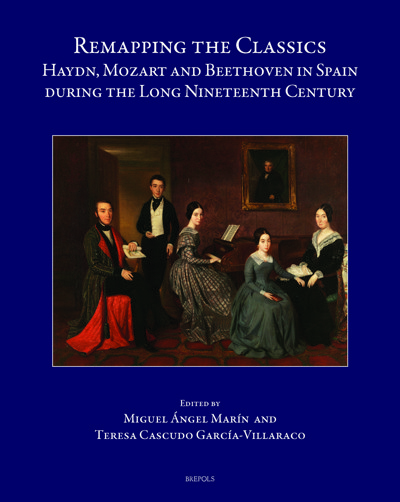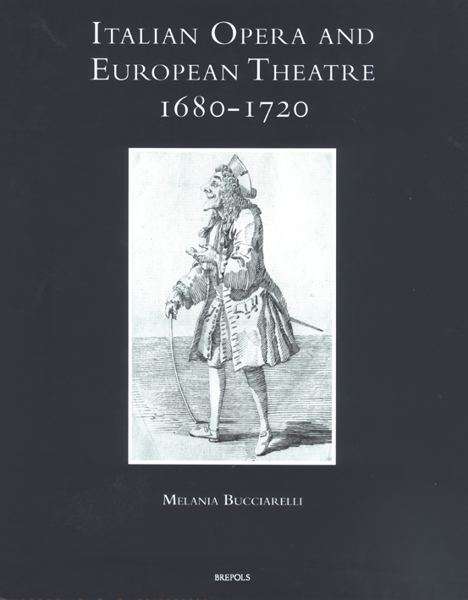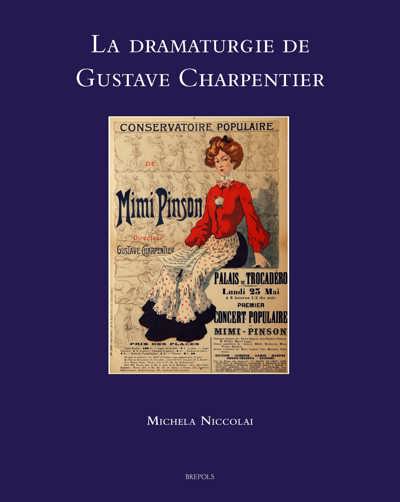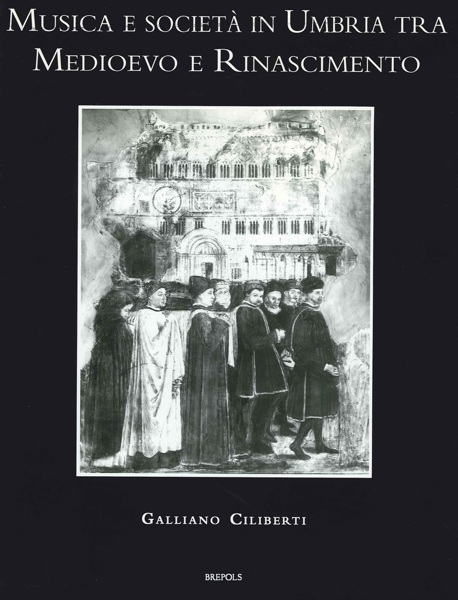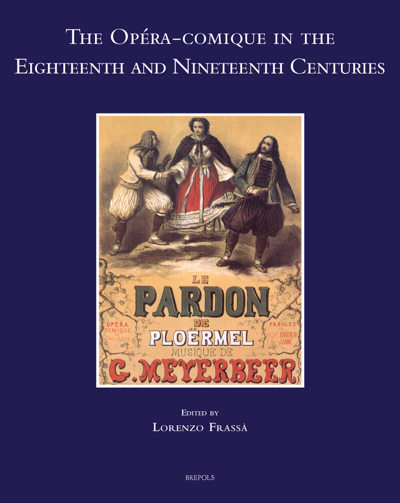
Remapping the Classics
Haydn, Mozart and Beethoven in Spain during the Long Nineteenth Century
Miguel Ángel Marín, Teresa Cascudo García-Villaraco (eds)
- Pages: 355 p.
- Size:210 x 270 mm
- Illustrations:25 b/w, 22 tables b/w., 21 music examples
- Language(s):English
- Publication Year:2024
- € 120,00 EXCL. VAT RETAIL PRICE
- ISBN: 978-2-503-61557-8
- Hardback
- Available
This publication explores the collective reception of works by Haydn, Mozart, and Beethoven in Spain.
"Remapping the Classics makes an important contribution to the study of Haydn, Mozart and Beethoven reception, blazing a new trail through Spain. Marín’s statement at the end of his chapter on Mozart’s Requiem that «results sometimes raise more questions than they provide answers» (p. 92) applies to a number of chapters in the volume, and is, of course, no bad thing. It is to be hoped that other scholars take inspiration from Remapping the Classics and continue to investigate the fascinating topic of Spanish reception of the Viennese triumvirate in the late eighteenth, nineteenth and twentieth centuries." (Simon Keefe, in Ad Parnassum, XXIII/44, 2025, p. 105)
"...ten absorbing case studies show how musicians, publishers, impresarios, patrons, critics, clergymen, and politicians built new cultures of performance.(...) the meticulous documentation of ‘new agents and spaces’ (p. vii) in Remapping the Classics reveals canonization in Spain to have been a dynamic, messy process subject to local tastes and agendas as much as broader European developments in performance culture." (Richard Will, in Music and Letters, published online, December 2025)
Miguel Ángel Marín (PhD University of London) is Full Professor of Music at the University of La Rioja, Spain. His main research interests focus on music in eighteenth- and nineteenth-century Spain, Joseph Haydn and concert studies. He is author of «Joseph Haydn y el cuarteto de cuerda» (2009) and «El “Réquiem” de Mozart. Una historia cultural» (2024), as well as co-editor of «Instrumental music in Eighteenth-century Spain» (2014), among a dozen of books.
Teresa Cascudo García-Villaraco (PhD Universidade Nova de Lisboa) is a Full Professor of Music at the Universidad de La Rioja, Spain. Her research has extensively focused on the relationship between music and nationalism, as well as on musical criticism. She was the editor of the collective volume Un «Beethoven Ibérico: dos siglos de transferencia cultural» (2021). She is currently the principal investigator of one of the LexiMus subprojects, dedicated to the study of music terminology in Spanish.
This publication is the first to explore the collective reception of works by Haydn, Mozart, and Beethoven in Spain. It addresses two main questions that shed light on the roles these composers played in a southern European context, viewed from Europe’s periphery. Firstly, the study examines how different contexts and performance practices influenced the presentation of these composers’ music. It delves into the transmission of musical texts and their adaptation to various demands through arrangements and transcriptions. Secondly, it explores how the physical and symbolic nature of performance spaces shaped listening habits. In nineteenth-century Spain, the salon, the church, and the concert hall were the primary venues for this music, similar to the rest of the Western world. However, some works ventured beyond these traditional spaces, finding new homes and creating fresh cultural meanings. These shifts not only altered the functions of the music but also transformed musical sociability, as detailed in the book. By examining the remapping of Haydn, Mozart, and Beethoven’s music to a southern European context, this book provides novel insights into the significant roles these composers played in Western culture.
Miguel Ángel Marín – Teresa Cascudo García-Villaraco, Preface
Haydn: Model and Dissemination
Héctor Eulogio Santos Conde, Haydn’s Symphonies in Spanish Cathedrals: Circulation and Functions
Óscar Manuel Sánchez, Haydn as a Model: Composing String Quartets in Late Eighteenth-Century Madrid
Mozart’s Impact: The Requiem and Don Giovanni
Miguel Ángel Marín, Listening to Mozart’s Requiem in Nineteenth-Century Spain
Cristina Roldán Fidalgo, Mozart’s Don Giovanni in Spanish Theatres (1834-1867)
Chamber Music: Space and Sociability
Lluís Bertran – Oriol Brugarolas, The Tusquets Family and the Construction of the Viennese Musical Canon in Barcelona (1780-1880)
Teresa Cascudo García-Villaraco – Carolina Queipo Gutiérrez, Haydn, Mozart and Beethoven in Professional Hands: The Sociedad de Cuartetos de Madrid between 1863 and 1875
Disciplining the Classics
Thomas Schmitt, Transforming the Classics: Haydn, Mozart and Beethoven on the Spanish Guitar
Laura de Miguel, Teaching the Classics: Haydn, Mozart and Beethoven at the Conservatorio de Madrid
Beethoven in the Early Twentieth Century
María Palacios Nieto – Isabel Jiménez Gutiérrez, From the Teatro Real to the Cinema: Remapping Beethoven for the Masses in Madrid (1904-1927)
Jaume Carbonell i Guberna, The Missa Solemnis in Barcelona: From the Première in 1906 to the Commemoration in 1927
Index of Names
Index of Cited Works
